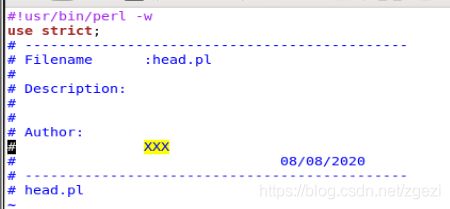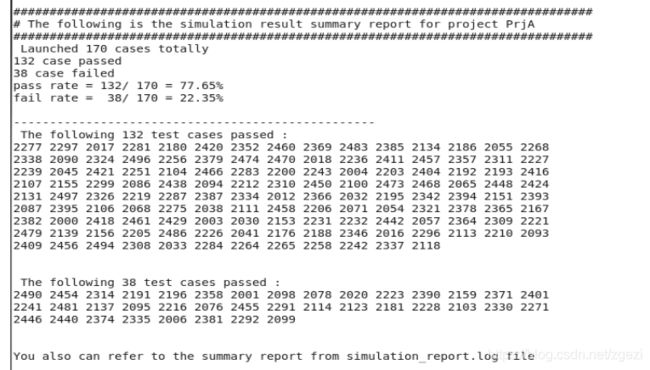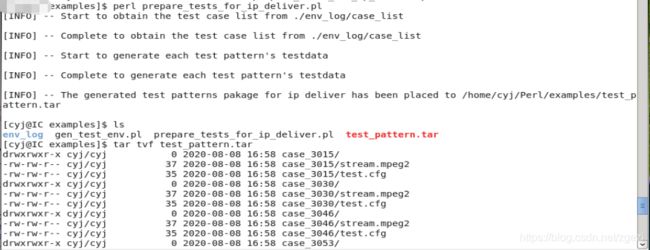Perl学习笔记(4)——应用实例
Perl学习笔记(4)--应用实例
- 例1--Perl顶部信息自动生成
- 例2--分析仿真结果
- 例3--打包IP的测试用例
- 产生用例的应用环境
- 打包IP的测试用例
例1–Perl顶部信息自动生成
#!usr/bin/perl -w
use strict;
use POSIX;
my $cur_time = strftime ("%m/%d/%Y",localtime());
my $file_name;
my $tab = " "x4;
if (@ARGV == 1) {
$file_name = $ARGV[0];
}
else {
&help_message();
}
open (LOG,">",$file_name) or die "Can not open $file_name for writing!\n";
my $str = "";
$str .= "#!usr/bin/perl -w\n";
$str .= "use strict;\n";
$str .= "# ---------------------------------------------\n";
$str .= "# Filename :$file_name \n";
$str .= "# \n";
$str .= "# Description: \n";
$str .= "# \n";
$str .= "# \n";
$str .= "# Author: \n";
$str .= "# XXX \n";
$str .= "# $cur_time \n";
$str .= "# ---------------------------------------------\n";
$str .= "# $file_name \n";
print LOG $str;
close LOG;
print "\n The header specified file $file_name has been gegerated!\n\n";
sub help_message {
print "\nThe $0 script used to generate the head of a perl example file header for training\n\n";
print "Usage : perl $0 $file_name \n\n";
print "Example:\n";
print "${tab}" . "-"x40 . "\n";
print "${tab}perl $0 ext4.6.pl\n";
print $tab . " --> generate the header for the specified perl file called ext4.6.pl\n\n";
}
例2–分析仿真结果
产生用例所需的sim_log文件:
#!/usr/bin/perl -w
use strict;
# -------------------------------------------------------
# File name : gen_sim_logs.pl
#
# Description :
# the script used to generate the simulation
# log files by random
#
# -------------------------------------------------------
# gen_sim_logs.pl
# -------------------------------------------------------
# Note:
# you need have a reference simulation log file
# to generate some real log files uded for prasing
# --------------------------------------------------------
my $ref_log_file = "ref_simv.log";
my $ref_log = "";
my $out_dir = "./out";
my $log_num = 200;
my $tab = ""x4;
my $verbose = 0;
my $debug = 0;
print "\n";
&obtain_ref_log($ref_log_file);
&gen_real_log_files($ref_log,$log_num,$out_dir);
sub obtain_ref_log {
my $file = shift ;
open (LOG,"<",$file) or die "Can not open $file for reading!\n";
while (defined (my $line = analyze simulation result,识别通过的case,失败的case,计算pass rate,fail rate
#!usr/bin/perl -w
use strict;
# ---------------------------------------------
# Filename :prase_sim_log_and_gen_report.pl
#
# Description:
#
#
# Author:
# XXX
# 08/07/2020
# ---------------------------------------------
# prase_sim_log_and_gen_report.pl
use Getopt::Long;
#use Spreadsheet::WriteExcel;
my $log_dir = "./out";
my $report_file = "simulation_report.log";
my $verbose = 0;
my $debug = 0;
my $help = 0;
my $tab = ""x4;
my $excel_en = 0;
my $info = "[INFO] --";
my $error = "[ERROR] --";
my @pass_cases;
my @fail_cases;
my @unknown_cases;
#parase the input options
GetOptions (
'log_dir=s' => \$log_dir,
'excel!' => \$excel_en,
'verbose!' => \$verbose,
'debug!' => \$debug,
'help!' => \$help,
);
&help_message if $help;
&parse_sim_logs($log_dir);
&gen_report($report_file);
sub parse_sim_logs {
my $sim_dir = shift;
print "\n${info} Start to parse the simulation log files in $sim_dir dir \n\n";
my @sim_files;
# @sim_files = glob("$sim_dir/*.log");
opendir DH, $sim_dir or die "Can not open $sim_dir dir for reading1\n";
while (my $name = readdir DH) {
$name = "${sim_dir}/${name}";
push (@sim_files, $name) if $name =~ /\.log$/;
}
closedir DH;
if (!defined $sim_files[0] || $sim_files[0] =~ /^\s*$/) {
print "${error} Do not obtain valid simulation log files.Exiting...\n\n";
exit;
}
foreach my $sim_file (@sim_files) {
my $case_id;
my $status;
open (SIM,"<",$sim_file) or die "Can not open $sim_file for reading!\n";
while (defined (my $line = 例3–打包IP的测试用例
产生用例的应用环境
#!usr/bin/perl -w
use strict;
use Getopt::Long;
# ---------------------------------------------
# Filename :gen_test_env.pl
#
# Description:
#
#
# Author:
# XXX
# 08/08/2020
# ---------------------------------------------
# gen_test_env.pl
# -----------------------------------------------------------
# case list : $env_dir/case_list
# cfg_files : $env_dir/sim_log/log_case_id/*.cfg
# test streams : $env_dir/test_streams/case_id/stream.mpeg2
# -----------------------------------------------------------
my $env_dir = "./env_log";
my $case_list = "case_list";
my $cfg_dir = "sim_log";
my $stream_dir = "test_streams";
my $case_num = 20;
my @cases;
my $help = 0;
my $debug = 0;
my $tab = " "x4;
GetOptions (
'env_dir=s' => \$env_dir,
'case_list=s' => \$case_list,
'cfg_dir' => \$cfg_dir,
'stream_dir=s' => \$case_num,
'help!' => \$help,
'debug!' => \$debug,
);
&help_message() if $help;
&check_dirs();
&gen_case_list($case_list, $case_num, 3000, 500);
&gen_cfg_files($cfg_dir, \@cases);
&gen_test_streams($stream_dir, \@cases);
print "[INFO] -- Please find the generated test enviromment from $env_dir dir!\n\n";
sub gen_test_streams {
my ($dir, $list_ref) = @_;
print "[INFO] -- start to generate the test stream files \n\n";
foreach my $cur_case (@$list_ref) {
$cur_case =~ s/^case_//;
my $cur_dir = "${dir}/case_${cur_case}";
my $stream_name = "${cur_dir}/stream.mpeg2";
&adjust_dir($cur_dir);
&gen_one_stream_file($cur_case, $stream_name);
}
print "[INFO] -- complete to generate the test stream files to $dir dir \n\n";
}
sub gen_one_stream_file {
my ($case, $name) = @_;
system("touch $name");
system("echo 'this is the stram file for $case case' > $name ");
print "${tab}[INFO] -- the test stream file $name for $case case has been generated\n\n" if $debug;
}
sub gen_cfg_files {
my ($dir,$list_ref) = @_;
print "[INFO] -- start to generate cfg files \n\n";
foreach my $case (@$list_ref) {
$case =~ s/^case_//;
my $cur_dir = "${dir}/log_case_${case}";
my $cfg_file = "${cur_dir}/test.cfg";
&adjust_dir($cur_dir);
&gen_cfg_content($case, $cfg_file);
}
print "[INFO] -- complete to generate cfg files into $dir dir \n\n";
}
sub gen_cfg_content {
my ($cur_case, $cfg_file) = @_;
system("touch $cfg_file");
system("echo 'this is the cfg file for $cur_case case' > $cfg_file");
print "${tab}[INFO] -- the cfg file $cfg_file for $cur_case case has been generated\n\n" if $debug;
}
# adjust each dirs
sub check_dirs {
$env_dir =~ s#\$|/$##;
$case_list = "${env_dir}/${case_list}";
$cfg_dir = "${env_dir}/${cfg_dir}";
$stream_dir = "${env_dir}/${stream_dir}";
&adjust_dir($env_dir);
&adjust_dir($cfg_dir);
&adjust_dir($stream_dir);
}
sub adjust_dir {
my $cur_dir = shift;
if (-e $cur_dir) {
system("rm -rf $cur_dir/*");
}
else {
system("mkdir $cur_dir");
}
}
# -----------------------------------------------------------------
# the sub program used to generated the test case list file for
# test the compare_caselist.pl script
#
#
# parameters:
# $file -- the file name that used to save the generated
# test case ids
# $num -- how many test case ids will be generated
# $start_val -- the test case id's start value
# $max_val -- the max value for the rand value
# -----------------------------------------------------------------
#
sub gen_case_list {
my ($file, $num, $start_val, $max_val) = @_;
my $case_info = "";
print "\n[INFO] -- start to generate the test case list file\n\n";
$case_info .= "# the following is a test case list for our project:\n\n";
for (my $i = 0; $i < $num ; $i++) {
my $case_id = $start_val + int(rand($max_val));
$case_info .= "$case_id " if (($case_id % 3) == 0);
$case_info .= "$case_id " if (($case_id % 3) == 1);
$case_info .= "$case_id \n\n" if (($case_id % 3) == 2);
push (@cases, $case_id) if (defined $cases[0] && (!(grep {$case_id =~ /^$_$/} @cases)));
push (@cases, $case_id) if (!defined $cases[0]);
}
open (LIST,">", $file) or die "Can not open $file for writing! \n\n";
print LIST $case_info;
close (LIST);
print "[INFO] -- a test case list has been written into $file file. \n\n";
}
sub help_message {
my $str = "";
print "\n$0 used to generate the test enviroment for the prepare test patterns for ip deliver script \n\n";
print "Usage : perl $0 OPTIONS \n\n";
print "OPTIONS:\n";
print "-"x40 . "\n";
print "${tab}-env_dir env_dir --specify the generated enviroment path.\n";
print "${tab}-case_list list_name --specify the case list file name.\n";
print "${tab}-cfg_dir cfg_dir --specify the generated cfg file path.\n";
print "${tab}-stream_dir stream_dir --specify the generated test stream's path.\n";
print "${tab}-case_num case_num --specify the case number that will be generated for deliver.\n";
print "${tab}-help --print out this help info.\n";
print "${tab}-debug --print out some info for debug.\n";
print "-"x40 . "\n";
exit;
}
打包IP的测试用例
#!usr/bin/perl -w
use strict;
use Getopt::Long;
# ---------------------------------------------
# Filename : prepare_tests_for_ip_deliver.pl
#
# Description:
# the script used to prepare the test patterns
# for ip release
#
#
# Author:
# XXX
# 08/08/2020
# ---------------------------------------------
my $output_name = "test_pattern";
my $tar_format = "tar"; # .tar.gz or .tar,can be modified by option
my $case_list = "./env_log/case_list";
my $cfg_dir = "./env_log/sim_log";
my $stream_path = "./env_log/test_streams";
my $help = 0;
my $debug = 0;
my $verbose = 0;
my $tab = " "x4;
my @cases;
my $cur_dir;
my $ERROR = "[ERROR] --";
my $INFO = "[INFO] --";
my @not_generated_list;
my @generated_list;
#if (@ARGV > 0) {
GetOptions (
'package_name=s'=> \$output_name,
'tar_format=s' => \$tar_format,
'case_list=s' => \$case_list,
'cfg_dir=s' => \$cfg_dir,
'stream_path=s' => \$stream_path,
'help!' => \$help,
'verbose' => \$verbose,
'debug!' => \$debug,
);
$cur_dir = `pwd`;
chomp $cur_dir;
$cur_dir =~ s#\$|/$##;
&adjust_one_dir(\$cfg_dir, $cur_dir) if defined $cfg_dir;
&adjust_one_dir(\$stream_path, $cur_dir) if defined $cur_dir;
$output_name =~ s/^\s*|\s*$//g;
$output_name =~ s#^\.+/|/$##g;
&help_message() if $help;
# --------------------------------------------------------------------
#
# generation flow:
# 1) obtain the case list from case list file
# 2) cp the config file and test stream into a new generated case dir
# 3) output the test pattern package in the specified format
# --------------------------------------------------------------------
&obtain_case_list($case_list);
&gen_testdata(\@cases);
# &gen_report();
# the sub program used to obtain the vaild test patterns from
# the read back line information
sub obtain_one_line_patterns {
my ($line, $arr_ref) = @_;
my @cur_cases = split(/\s+/, $line);
if (defined $cur_cases[0] && $cur_cases[0] !~ /^\s*$/) {
foreach my $cur_case (@cur_cases) {
$cur_case =~ s/^\s*|\s*$//g;
$cur_case =~ s/^case_//;
push (@$arr_ref, $cur_case) if ($cur_case =~ /^\d+$/);
}
}
}
sub gen_testdata {
my $case_ref = shift;
print "${INFO} Start to generate each test pattern's testdata \n\n";
# prepare the tmp dir for testdata generation;
my $tmp_dir = "./tmp_dir";
&prepare_out_dir($tmp_dir);
my $tmp_pkg_dir = "${tmp_dir}/${output_name}";
&adjust_one_dir(\$tmp_pkg_dir, $cur_dir);
system ("rm -rf 4{tmp_pkg_dir}/*");
foreach my $cur_case (@$case_ref) {
my $stream_name;
$cur_case =~ s/^case_//;
my $cur_case_dir = "${tmp_pkg_dir}/case_${cur_case}";
my $cur_cfg_file = "${cfg_dir}/log_case_${cur_case}/test.cfg";
my $cur_stream_file = "${stream_path}/case_${cur_case}/stream.mpeg2";
#obtain the config file
if (-e "$cur_cfg_file") {
system("mkdir -p ${cur_case_dir}");
system("cp ${cur_cfg_file} ${cur_case_dir}");
}
else {
push (@not_generated_list, $cur_case);
next;
}
#obtain the test stream files
if (-e "${cur_stream_file}") {
system("cp ${cur_stream_file} ${cur_case_dir}");
}
else {
push (@not_generated_list, $cur_case);
next;
}
push (@generated_list, $cur_case);
}
# &adjust_one_dir (\$output_name, $cur_dir);
my $final_pkg_name = &output_test_patters_package($tmp_pkg_dir, $output_name);
system("rm -rf $tmp_dir");
system("rm -rf $output_name");
print "${INFO} Complete to generate each test pattern's testdata \n\n";
print "${INFO} The generated test patterns pakage for ip deliver has been placed to $final_pkg_name \n\n";
}
sub output_test_patters_package {
my ($tmp_pkg_dir, $package_name) = @_;
# check the tar format
$tar_format =~ s/^\.// if defined $tar_format;
if (!defined $tar_format || (defined $tar_format && $tar_format !~ /^tar$/ && $tar_format !~ /^tar\.gz$/)) {
print "${ERROR} the tar formay should be \"tar\" or \"tar.gz\" but detect a not valid value.Exiting...\n\n";
}
system("mv $tmp_pkg_dir $package_name");
chdir $package_name;
if ($tar_format eq "tar") {
system("tar cvf ${package_name}.tar * > /dev/null");
system("mv ${package_name}.tar $cur_dir");
chdir $cur_dir;
return "${cur_dir}/${package_name}.tar";
}
elsif ($tar_format eq "tar.gz") {
system("tar zcvf ${package_name}.tar.gtz * > /dev/null");
system("mv ${package_name}.tar.gz $cur_dir");
chdir $cur_dir;
return "${cur_dir}/${package_name}.tar";
}
}
sub prepare_out_dir {
my $dir_name = shift;
if (-e $dir_name) {
system("rm -rf $dir_name/*");
} else {
system("mkdir $dir_name");
}
}
sub adjust_one_dir {
my ($dir_ref, $cur_path) = @_;
my $dir = $$dir_ref;
$dir =~ s/^\s*|\s*$//g;
$dir =~ s%\$|/$%%;
if ($dir =~ /^\.\/(\w+.*)$/) {
$dir = "${cur_path}/${dir}";
} elsif ($dir =~ /^\.\.\/\w+/) {
$dir = "${cur_path}/${dir}";
} elsif ($dir =~ /^\w+$/) {
$dir = "${cur_path}/${dir}";
}
$$dir_ref = $dir;
}
sub obtain_case_list {
my $file = shift;
print "${INFO} Start to obtain the test case list from $file\n\n";
if (defined $file && $file !~ /^\s*$/ && (-e $file)) {
open(LOG,"<",$file) or die "Can not open $file for reading!\n";
while(






